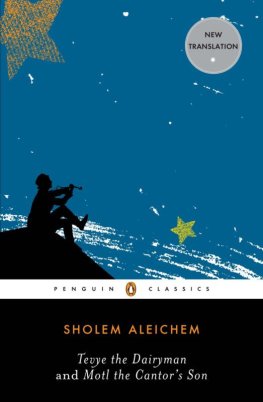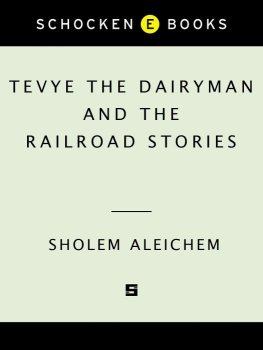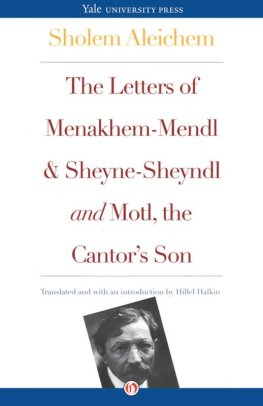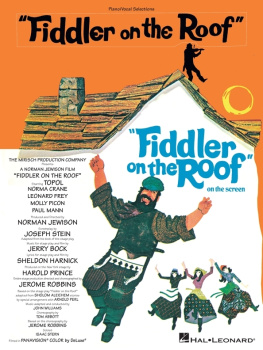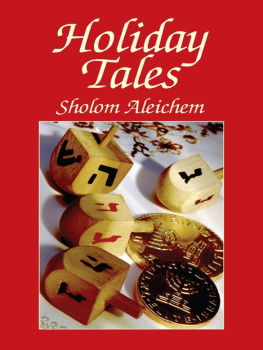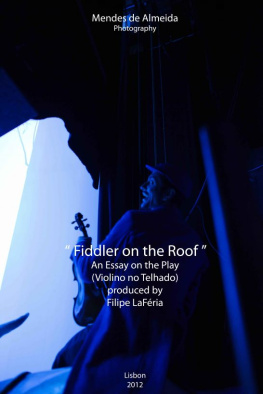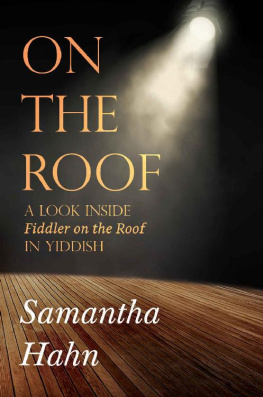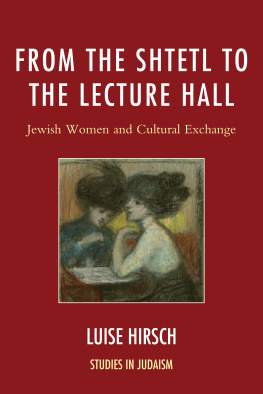
Stempenyu
A Jewish Romance
by
Sholom Aleichem
TO MY DEARLY BELOVED GRANDFATHER REB MENDALLE MOCHER SEPHORIM
To my dear grandfather, greetings!
Stempenyu, my first long novel, which I inscribe to you, is yours; not only because I have the honour to inscribe it to you, but also because it was you who instilled into me the desire to write such a novel. In one of your letters you said to me:
I should have advised you not to write a novel. Your tastes, and your genre, lie elsewhere. And I doubt if there is anything as romantic in the lives of our people. They are so different from the rest of the world that one must understand them perfectly, before attempting to write about them!
Your words sank deep into my heart; and I began to realize how much, and in what way, a Jewish novel must differ from all the other novels. The truth is that the circumstances under which the Jew falls in love, and declares his passion, are altogether different from the circumstances which control the lives of other men. Besides, the Jewish nation has its own peculiarities its own habits, and manners, and customs. And, our national symbols have remained unchanged in spite of everything. And, these too, must have their place in the Jewish novel if it is to bear a true resemblance to Jewish life.
All this came home to me very forcibly after hearing you talk. And, the desire sprang up within me to incarnate what I learnt from you in the persons of the novel Rochalle the Beautiful, who plays the leading role, and all the others who take their several places in the novel, revolving around the life of Rochalle as the moths fly around a candle.
How much stress I have attained is a different question. My aim was to write a novel in strict accordance with your wishes; that is, according to the views you have expressed regarding the requirements, and the equipment of every Jewish novelist.
And, in this also is Stempenyu yours, dear grandfather the name is yours, and the ideas in it are yours. I found amongst your later works a reference to the connection between Stempenyu and a love-philtre. That was enough to recall to my mind all the wonderful stories I had heard at school about Stempenyu. My imagination was fired. Memory aided me, and the story of the following pages came into being.
It may be that in my district, in Lithuania, the Jews have never heard anything of Stempenyu. And, for that reason, the name may sound rather strange to them perhaps a little wild. But, for that again, the name is well known in every town and village lying between Tasapevka and Yehupetz, to say nothing of the towns and villages of your neighborhood Gennillophatzka, Tsviattsetss, and Tunneyadevka. The youngest child in any of these places knows who Stempenyu was, whom he sprang from, and after what fashion his proud life was spent.
But, I did not intend to centre all the interest exclusively in Stempenyu. I meant to distribute it among three persons, or as they might be called, three characters: the Jewish artiste, Stempenyu, and his fiddle; the Jewish girl, Rochalle, in all her Jewish purity, nobility of thought and action; and, the Jewish woman, Freidel, whose talent for business led her into an exaggerated anxiety about money. These were figures which stood up before me, each in a world of his or her own. And, these three, Stempenyu, Rochalle, and Freidel, are seated on a das at the top of the tent, so to speak, while all the rest of the figures in the novel sit over against them, or move here and there, backwards and forwards, in full view of the three principal characters, and flit in and out under their eyes. It was for this reason because they only pass up and down before the three, and do not take any perceptible part in the story that I have sketched their characters and doings in the fewest words possible.
I imagine that our Jewish musicians, our composers and our players, live in a manner peculiar to themselves alone. And, it is worth while investigating their mode of living with far more care and insight than I can lay claim to having brought to bear on the musicians portrayed in this novel. To do justice to the task, one must possess, dear grandfather, your penetration, your powers of description, and your experience. Where is one to get these qualifications? How can one hope to gain your courage and your patience?
Over any work, you wrote me in another letter, over any piece of work, dear grand-child, one must sweat and toil. One must work, and work at chiseling every separate word to perfection. Remember what I say to you one must keep on chiselling, and chiselling.
Chiselling! In this lies the whole secret of the woes of all us who are still young. We have never the time to chisel. We rush off to get the whole of our plans completed while standing on one foot, as the saying goes. We wish to finish as well as to begin everything in the one breath. We cannot stop to think out each argument we employ; and, certainly, not to chisel each and every separate word. We have not the patience for these slow growths.
I know, dear grandfather I feel how necessary it would be to purify Stempenyu through many waters. In your hands, the book would have taken on an altogether different appearance. It would have been a different book from what it is. You would have made of it a story about a story, a story within a story, and a story in itself as well.
I should like, you wrote in another letter, I should like that in a book there should be not only beauty of form, but also truth, and depth, and sympathy, as we find in life itself. There should be something to think about as well as to amuse!
But, the secret of how to bring in these qualities remains with you. No one else has been able to discover it. Only you can create pictures that have many sides to them a right side and a left, an outer covering and a lining, so to say. Only you can make the Yiddish novel something which is at once clear and mystical. Therefore, it comes about that you are the only true artist in our literature. So that we young folks dare not liken ourselves to you. We are profoundly thankful if we manage to write a plain story without deformities, having all its limbs and members, according to the simplest laws and canons of literature.
Beloved grandfather, will you accept this little offering from me my first Yiddish novel? I can only accept the hope that it will give you some measure of happiness to know that you inspired it. Perhaps it will appeal to you because I took its name from one of your works. I dare scarcely hope that you will find in its pages something which will meet with your approbation. That I may provide you with a few hours amusement is the most that I can hope for.
Wishing you all the good in life hat you can possibly wish for yourself, I remain, your devoted grandchild,
THE AUTHOR
KIEFF, 1886
STEMPENYU was the nickname he inherited from his father. His father peace be unto him was called Berrel Bass, or Berrel Stempenyu, after the village of Stempenyu in the district of Tasapevka. Berrel played the double-bass, was a good story-teller, and a wit, and could invent pretty rhymes. He suffered from an incurable disease, and played at weddings in the disguise of a beggar. He could also amuse the company by turning up his eyes, making grimaces, dancing like a bear, and imitating all sorts of sounds. He had a weakness for playing practical jokes, such as throwing water on the floor in the middle of the dancing, and pinning to the backs of the wedding guests anything he could lay his hands on.
The talent for music was inherited in their family for many generations. Stempenyus father, Berrel Bass, played the double-bass, as his nickname indicated. Berrels father, Shmulik, played the trumpet; and his father, Phillip, played on the harpsichord; and Phillips father was Ephraim Fiddler, because of his talent for playing the fiddle. In short, Stempenyu was descended from innumerable generations of musicians. Nor was he ashamed of the fact that they all had lived by their playing. He was not at all like the average Jewish workman who thinks it is fashionable to be ashamed of the work in his hands. And, it was true also that Stempenyu had nothing to be ashamed of. It was no trifling matter to make the name he had made for himself in the district of Tasapevka in the whole world, almost. It was no laughing matter for a man to bear the name of Stempenyu.
Next page

